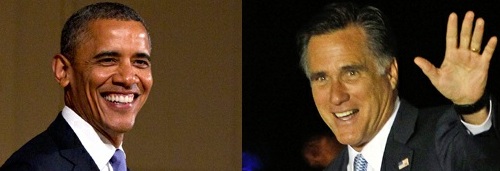Why are Obama’s re-election odds so short?

David Herdson asks “Is Obama really so assured of some swingback?”
Conventions come and conventions go. Providing they go more or less to plan, the candidate will receive a short-term bounce in the polls, some favourable coverage in the media and a reinvigorated campaign. Such has been largely the lot of Mitt Romney this last week and such will likely be the case for Barack Obama next. Romney has either closed the gap or taken a slight lead, depending on which polls you believe, but no-one expects it to last once the spotlight turns to the Democrats.
Nor should they realistically expect the bounce Obama will no doubt enjoy to be sustained once the campaign proper begins, post-Labor Day. Which begs the question as to why it’s pretty much impossible to get better than 1/2 for him to be returned to the White House.
It is true that he built himself a very high base in 2008 from which to start, that most presidents in the TV era are re-elected, and that he’s consistently maintained a lead – albeit a small one – over Romney in head-to-heads all year. Even so, while he should rightly be favourite, should he really be quite so strong?
The case against rests on a number of points. There’s the simple maths to start with. Even before the Republican Convention, Romney trailed by only small single figures, both nationally and in the swing states. The RCP averages should be taken with a pinch of salt, but it shouldn’t be ignored that around 100 electoral college votes lie in states where Obama is given a lead of less than 2% – way more than enough to swing the contest (there are just 15 ECVs in states where Romney has a similarly small lead). This is knife-edge territory.
In the subject areas, according to a recent Gallup poll, Obama has a lead on things such as likeability, taxes and Medicare but Romney leads on the economy, which is also seen as the most important issue. Again, the president probably has the edge overall but it’s close.
On the subject of the polls, a critical factor – possibly the critical factor – will be relative turnout. Obama enthused many first-time voters to go to the polls in 2008 with his message of Hope and Change. He’ll find it much harder this time round with a record in office but modelling how far the drop-off goes will be difficult.
That brings us on to negative campaigning. For all sorts of reasons, it was hard for John McCain to campaign negatively against Obama. There was his message, where doing down Hope is almost akin to doing down America. Even more, there was his historic role as the first credible black candidate for the White House. To some extent that’s still the case but it’s far less so than it was. His colour is no longer a novelty or even an issue spoken of (though it will still matter to some demographics, most especially the African-Americans).
By contrast, it’s far easier to attack a record in office than a person aspiring to it. On the other hand, the very establishment a rather stiff character of Romney probably makes for an easier target than McCain did. It’s also easier if you have the money. In 2008, Obama outspent McCain by more than 2:1. This year, spending is likely to be a good deal more even.
Then there’s the campaign itself. Obama still significantly out-performs Romney in the charisma stakes but there were more charismatic candidates in the Republican primaries and Romney still came through. He did so principally by not making any fatal mistakes and relatively few mistakes at all. Considering how many debates he took part in, that was no small achievement. There’s no reason to expect any different in the general election. On the other side, Obama has to work out how to avoid the kind of defensive, safety-first, attritional campaign that reduces him to Just Another Politician, where he would be vulnerable.
The big question is whether we can expect the polls to change much between the pre-conventions period and election day. There are plenty of reasons why they might but not many why they should. To that end, the odds ought to mirror the polls rather more than they are doing.